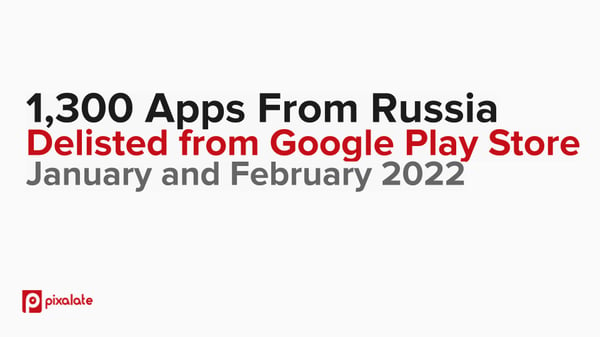
This week's review of ad fraud and privacy in the digital advertising space.
![]()
In the light of Russia’s ongoing invasion of Ukraine, Pixalate compiled a list of mobile apps and website domains for which title and/or developer name matches entities that have been added to the most recent US-OFAC sanctions lists.
The list covers a full month of sanctions from February 24 until March 24, 2022.

Pixalate researched which apps linked to Russian developers were removed from the Google Play store in the first two months of 2022.
Pixalate found that:

Bloomberg reports that Apple and Meta mistakenly provided user data to hackers posing as law enforcement officials. The hackers are believed to be associated with a group known as the “Recursion Team” and some of the information they obtained is suspected to have been used in harassment campaigns and possibly to facilitate financial fraud.

AdAge published an article detailing that a lawsuit against Meta – Facebook’s parent company – can proceed and that more than 2 million small ad buyers are able to register as plaintiffs.
The lawsuit alleges that Meta overstated the size of its audience to ad buyers. In 2021, Facebook’s audience measuring tool was found to count fake and duplicate accounts among its metrics.

Reuters reported that Virginia, Colorado, California and most recently, Utah have passed comprehensive privacy legislation. As more states look to follow suit in 2022 and 2023, businesses need to evaluate their exposure.
Reuters goes on to state that “even in those states where consensus is elusive on comprehensive legislation, businesses should continue to monitor the legislative landscape.”
*By entering your email address and clicking Subscribe, you are agreeing to our Terms of Use and Privacy Policy.
These Stories on Weekly Recaps
*By entering your email address and clicking Subscribe, you are agreeing to our Terms of Use and Privacy Policy.

Disclaimer: The content of this page reflects Pixalate’s opinions with respect to the factors that Pixalate believes can be useful to the digital media industry. Any proprietary data shared is grounded in Pixalate’s proprietary technology and analytics, which Pixalate is continuously evaluating and updating. Any references to outside sources should not be construed as endorsements. Pixalate’s opinions are just that - opinion, not facts or guarantees.
Per the MRC, “'Fraud' is not intended to represent fraud as defined in various laws, statutes and ordinances or as conventionally used in U.S. Court or other legal proceedings, but rather a custom definition strictly for advertising measurement purposes. Also per the MRC, “‘Invalid Traffic’ is defined generally as traffic that does not meet certain ad serving quality or completeness criteria, or otherwise does not represent legitimate ad traffic that should be included in measurement counts. Among the reasons why ad traffic may be deemed invalid is it is a result of non-human traffic (spiders, bots, etc.), or activity designed to produce fraudulent traffic.”

